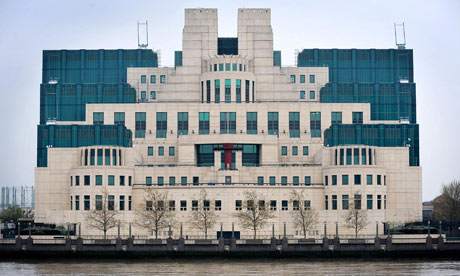Leak about UK involvement described as despicable by CIA as anger turns to Obama administration for compromising mission

Detailed leaks of operational information about the foiled underwear bomb plot are causing growing anger in the US intelligence community, with former agents blaming the Obama administration for undermining national security and compromising the British services, MI6 and MI5.
The Guardian has learned from Saudi sources that the agent was not a Saudi national as was widely reported, but a Yemeni. He was born in Saudi Arabia, in the port city of Jeddah, and then studied and worked in the UK, where he acquired a British passport.
Mike Scheur, the former head of the CIA’s Bin Laden unit, said the leaking about the nuts and bolts of British involvement was despicable and would make a repeat of the operation difficult. “MI6 should be as angry as hell. This is something that the prime minister should raise with the president, if he has the balls. This is really tragic,” Scheur said.
He added: “Any information disclosed is too much information. This does seem to be a tawdry political thing.”
He noted that the leak came on the heels of a series of disclosures over the last 10 days, beginning with a report that the CIA wanted to expand its drone attacks in Yemen, Barack Obama making a surprise trip to Afghanistan around the time of the Bin Laden anniversary and “then this inexplicable leak”.
Robert Grenier, former head of the CIA counter-terrorism centre, said: “As for British Intelligence, I suppose, but do not know, that they must be very unhappy. They are often exasperated, quite reasonably, with their American friends, who are far more leak-prone than they.
“In their place, I would think two and three times before sharing with the Americans, and then only do it if I had to. The problem with that dynamic is that you don’t know what you don’t know, and what opportunities you might be missing when you decide not to share. The Americans are doing a very good job of undermining trust, and the problem starts at the top.”
The name of the British passport-holder has not yet been released but may come out through al-Qaida in the Arabian Peninsula. He is reported to have spent time at at language school in Sana’a, the Yemeni capital, and been recruited by al-Qaida as a suicide bomber.
Mustafa Alani of the Gulf Research Centre in Dubai told CNN that the bomber had been recruited by the Saudis to penetrate al-Qaida about a year ago, in part because the group would be attracted by the fact that his UK passport meant he could travel to the US without a visa.
“Apparently he was able to convince al-Qaida that he is genuinely ready to carry out the mission,” said Alani, who CNN said had been briefed by Saudi counter-terrorism officials. Alani said his understanding was that al-Qaida in the Arabian Peninsula (Aqap) intended the would-be suicide bomber to fly through a Gulf country to connect to a US-bound flight.
The Saudi operation culminated with the agent and another Saudi informant – likely his handler – being whisked out of Yemen, Alani said. “My information is that he was pulled out after the device was handed to him, and they ordered the green light to carry out the operation,” he told the US network.
Yemen has been a key target country for the CIA and MI6 in line with the growing strength of Aqap in recent years. But the lead on the ground has been taken by the Saudi intelligence service, the Mabahith, which is best placed to operate in the local environment and exploit links on either side of the border.
Both the US and British intelligence communities are known to work closely with their Saudi counterparts and both have liaison officers permanently stationed in Riyadh and Sana’a.
Aqap moved its operations to Yemen in 2007 after the defeat of al-Qaida in Saudi Arabia. The Nigerian “underwear bomber”, Umar Farouk Abdulmutallab, who tried to blow up a flight from Amsterdam to Detroit in 2009, was radicalised in Yemen while claiming to be there as a student.
The US, Britain and the Saudis are likely to have preferred their own intelligence operation to co-operation with the Yemeni security authorities, who are anxious to avoid being seen as a western pawn.
Cables released by WikiLeaks exposed the scale of US covert involvement in the Arab world’s poorest country. In 2009 the Saudi deputy interior minister, Prince Mohammed bin Nayef, told General James Jones, President Obama’s national security adviser: “The Saudis have been monitoring conversations of al-Qaida operatives in Yemen very closely and whereas before the [recent] attack they were hearing relaxed 20-minute phone conversations over cellphones, after the attack the phones went virtually silent. This suggests that at least for now these operatives are more focused on their own security rather than on planning operations.”
Bin Nayef’s support for operations against Aqap is unsurprising. He survived an assassination attempt in Jeddah in September 2009 when a Saudi Aqap operative named Abdullah al-Asiri feigned repentance for his jihadi views in a meeting with the prince then blew himself up with a bomb concealed in his anus. Al-Asiri’s brother Ibrahim is Aqap’s chief bombmaker.
Gregory Johnsen, a US expert on Aqap, pondered on his blog whether the group would now reveal the identity of the undercover agent. “Undoubtedly, Aqap recorded a marytrdom video of the undercover agent before giving him the bomb,” Johnsen wrote. “The US and Saudis won’t divulge his identity for obvious reasons, but will Aqap?”